We recently connected with Charlie Souza and have shared our conversation below.
Charlie , thanks for joining us, excited to have you contributing your stories and insights. Did you always know you wanted to pursue a creative or artistic career? When did you first know?
Growing up hasn’t been easy, as I am still working on that, and for some reason or other I really don’t think I will ever grow up! But in my early years through many difficult times in my early childhood and then into “the formative years,” there were things that happened to me which could have turned me into a thief or a murderer. Just the opposite happened because I had the seed of music planted in me from birth. It became a way to express myself. Out of this came some healing and some growth which helped me turn my life around. I struggled with self-esteem and self-confidence until I learned that I could do something positive to feel good about myself. That led me to a certain amount of growth and pride which I used in many different ways. It wasn’t always easy to be the man I could be; it took a lot of time, making plenty of mistakes along the way as I was damaged goods, but I had a song in my heart and the love of life.
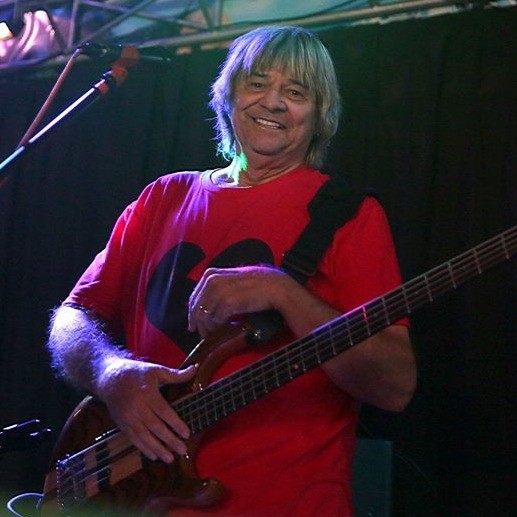
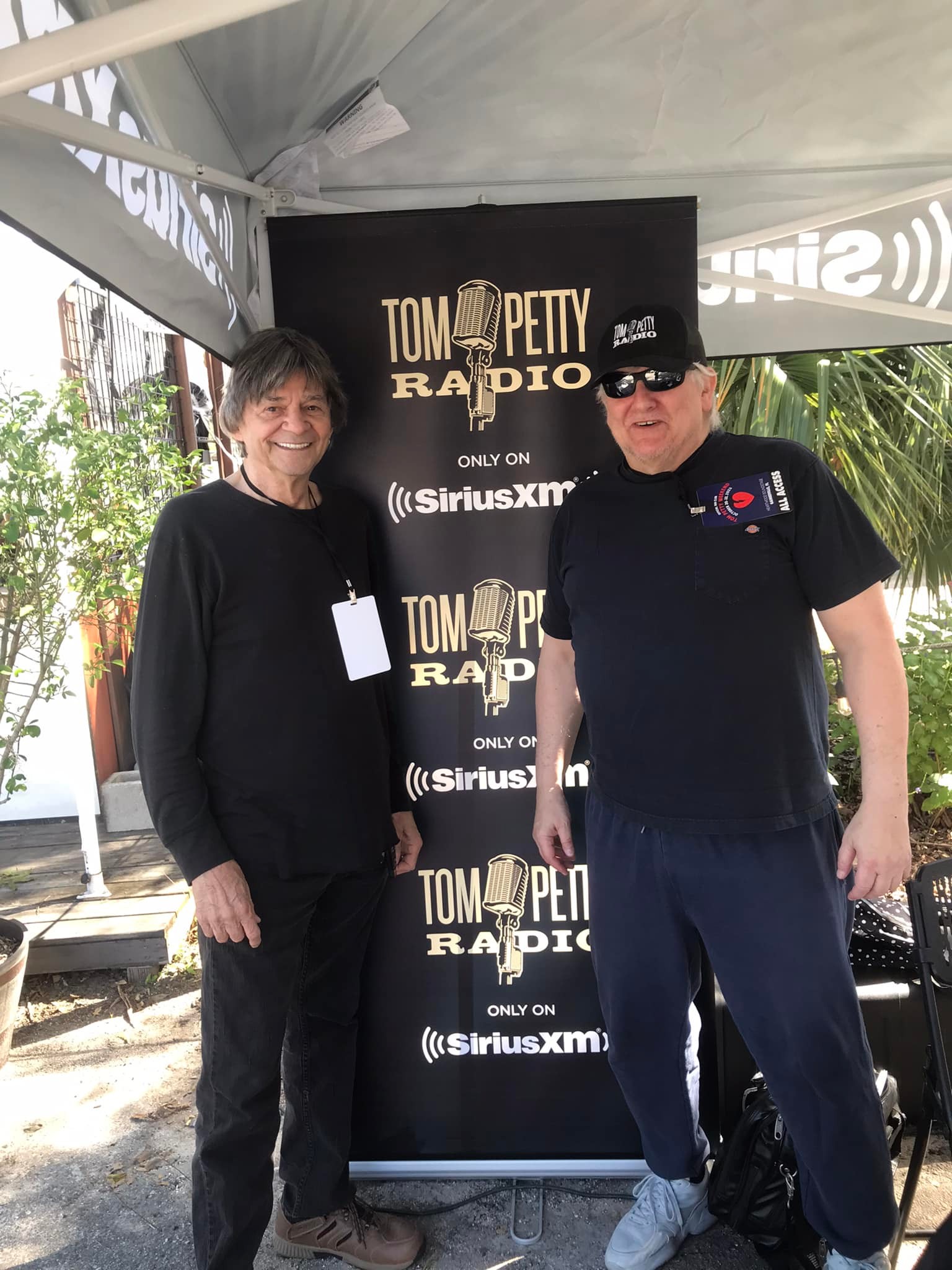
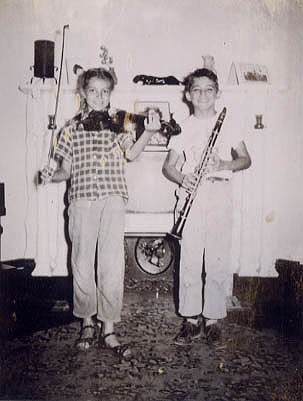
As always, we appreciate you sharing your insights and we’ve got a few more questions for you, but before we get to all of that can you take a minute to introduce yourself and give our readers some of your back background and context?
Music struck a chord with me at an early age in this classic small town. Mama and Daddy surprised me on my fourth birthday celebration with four flaming candles on a small square cake. My mother’s voice was heavenly and amazing to hear as she sang Happy Birthday to me. That was the very first time I remember hearing music and feeling the love only music can convey. I was enchanted and hooked on music from then on! At six years old, I attended my first day of school escorted by my mother to first grade at Westshore Elementary. This red brick school house was where, in the following years, I was soon to become very popular with all the young school girls and also began playing the clarinet by the third grade while my sistere Ruthie took up the violin.
At age 11, I sold newspapers at MacDill Air Force Base which is now the headquarters for the war on terror. That is where I learned to shoot pool. Learning how to gamble with the soldiers, I traded my newspaper money for a few lessons in billiards during the time I was selling papers. Learning quickly that entertaining people gave me a feeling of satisfaction, I kept the men stationed there amused by pitching the papers with my Donald Duck voice. I would end up back at the base commissary for the ride home but not before I had spent most of my money on the jukebox and playing pinball.
My boss, “the paper lady” Joan, would pick us boys up in her ‘52 Chevy and drive us out to our routes on the base. She had a stick in her hand while driving and would occasionally whack one of us if we were acting up. But I maintained my attention to the music coming out of the back speakers and there again, the bass was the prevalent instrument for me.
Less than two months after my 13th birthday, while cleaning up my room with the radio blasting, I was unaware of the commotion going on upstairs. One of the neighborhood kids, Sammy, came for a visit. On a customary Saturday, he would stop by to see if I could come out and play. Mama was taking a nap upstairs so I told Sammy I couldn’t go out because I had to clean my room. He asked, “Can I go up and ask your mother if you can?” Of course I said “Yes” and continued to run the vacuum cleaner in my little room under the stairs as Sammy climbed the stairs and went up. I thought nothing of it at the time, but it ended up to be one of the biggest mistakes in my life. Sammy found my mother in the upstairs bedroom where he attacked her, physically knocking her down to the floor. Being in a weakened state due to her prolonged ill health, she was unable to fight back when Sammy beat her and stabbed her repeatedly with a knife, leaving bloody footprints as he disappeared out the upstairs window, down a tree next to the house, and up the back alley to his home just down the street.
I had heard a thump while cleaning my room and ran upstairs only to discover my mother lying on the floor in a pool of blood next to her bed. I was shocked by this horrific sight and didn’t know what to do. All I could think of was pulling her robe over her to cover her half nude body. She was only asleep I thought, but she wasn’t answering me. Then I realized my mother was dead! Right then, the phone rang. It was my sister Ruthie calling. I frantically shouted, “Mama’s dead, Mama’s dead!” She thought I was kidding for a moment, asked a few questions, which I was unable to answer, and then after a few short words, we hung up. This event was all so very shocking to me and had traumatized me my entire life until I finally sought counseling in my 50s. Writing about it even now seems to help, but I will never forget it, never!
Shortly thereafter, in the eighteen or so months to follow, while still traumatized and grieving the loss of my mother, I was sexually molested by a person close to me—my legal guardian and new brother-in-law. While living with Sylvia and her husband (who, when I was a paperboy at MacDill, had pressured me to introduce him to her when he found out I had an older sister), I lovingly helped watch over my two nieces, Sheila and Beverly. But, during this time, with no regard to what I had just experienced, I was forced to have to deal with being manipulated into situations that were scary and demeaning, and all the while were kept secret from my sisters and other family members. I would be cornered when no one was around and forced into humiliating acts with him. This was certain sexual abuse! These unthinkable, reoccurring experiences gave me such low self-esteem that I never thought I would make it out of the pain that lived inside me for many years to come.
Not too long after, Sylvia and her family moved back to Port Tampa, where I went to live with them again. The secret still remained as the trapping, cornering and molestation continued. I told Sylvia I could not live with them anymore. At that point, during my sophomore year in high school, right after President Kennedy was assassinated, I found a great friend and buddy, Tim Cleary. After telling him what was happening at home, he said to come and stay with him and his family at MacDill. He said one more kid in his family of twelve wouldn’t matter. I earned my keep on the paper route with him. I didn’t know it then, but he saved my life.
Music continued to be a major influence and escape from all my bad experiences in my life and served as an avenue for hope and escape. I joined the Robinson High School marching band, playing clarinet. I also had my first guitar, a used and battered six-string I had bought in Lakeland, and I learned to play bar chords by tuning the strings differently. Folk music was ringing in the school halls and on street corners – and “the times they were a changin’.” I strummed Peter, Paul & Mary and the Kingston Trio on the guitar and learned how to play with songs like Blowin’ in the Wind.
One afternoon Tim and I heard the Beatles for the first time on the radio. The song was I Want To Hold Your Hand. I knew right then where my life was headed. Tim and I went down to the Teen Center and started a band with the manager’s son, Paul, on drums and John Doughty on guitar. The Coachmen band was born!—though I think we only played one paying gig. I was destined to be in a band because the music made me feel good and that made me feel good about myself!
The seeds that gave me the dream of making music were planted—and I so wanted and needed to make that dream come true. Soon, I would be asked to play bass guitar with my first very successful band, The Tropics!
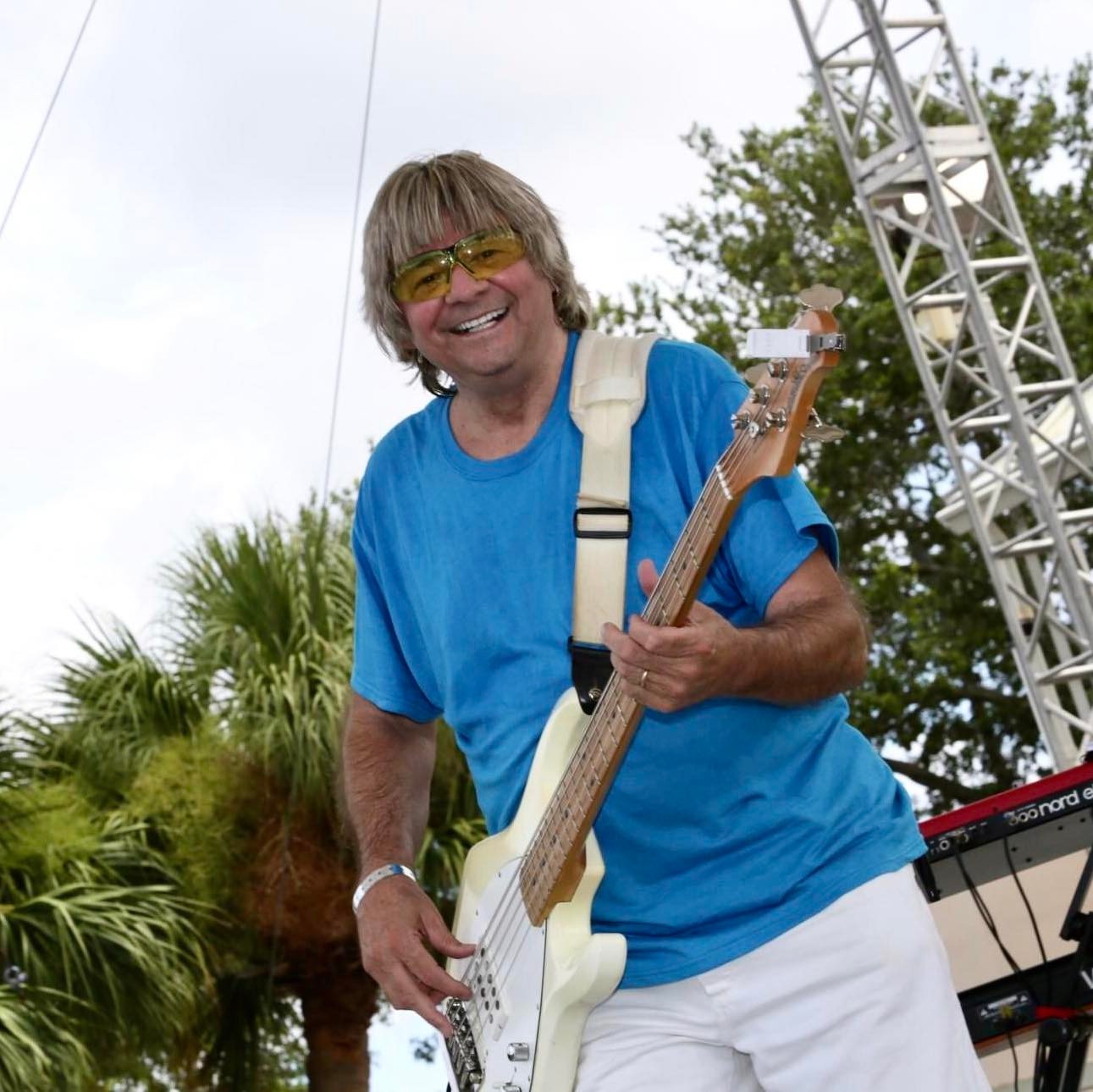


We’d love to hear a story of resilience from your journey.
The band Tim and I had formed, the Coachmen, played mainly instrumental surfer music, because none of us had learned to sing and play at the same time yet. My new band, The Tropics, started out in the early ‘60s with Wayne Guida, trumpet, Ronnie Ferrer, sax, and Spencer Hinkle, drums, and played tunes like Let Your Love Light Shine On Me. (Love Lights) Dick and Margie Sexton were the owners of the Surfer’s Club and St. Petersburg’s Silver Star Skating Rink, an outdoor skating rink that featured bands on weekends. In 1964, we auditioned for them and Margie decided to back the band as our manager as long as we dropped the horns and became a “Beatles-type” band.
The Tropics now included members Buddy Pendergrass, band leader, Mel Dryer, lead vocals, Eric Turner on guitar, Bobby Shea, drums, and yours truly on bass guitar. We were building a buzz in and around the coast of Florida—amassing a following of fans.
Playing regularly as the house band at the Surfer’s Club, we honed our skills. We arranged high energy stage routines and choreography, played upbeat rock songs and danceable funk songs by James Brown and the Beatles, changing our wardrobes and dance routines for each set. We weren’t just a few guys in a rock band anymore; we became self-made entertainers. By then, The Tropics were solid musically and we started writing our own tunes. In October 1965, we recorded I Want More which became a number one hit locally. This single was written during a band break one evening at the Surfer’s Club with the help of our producer, Phil Gernhard, and was released on the Knight label with Freeport Records distributing it nationally. This resulted in a surge of popularity which led to an incredible show that drew over 5,000 fans to Tampa’s Curtis-Hixon Hall.
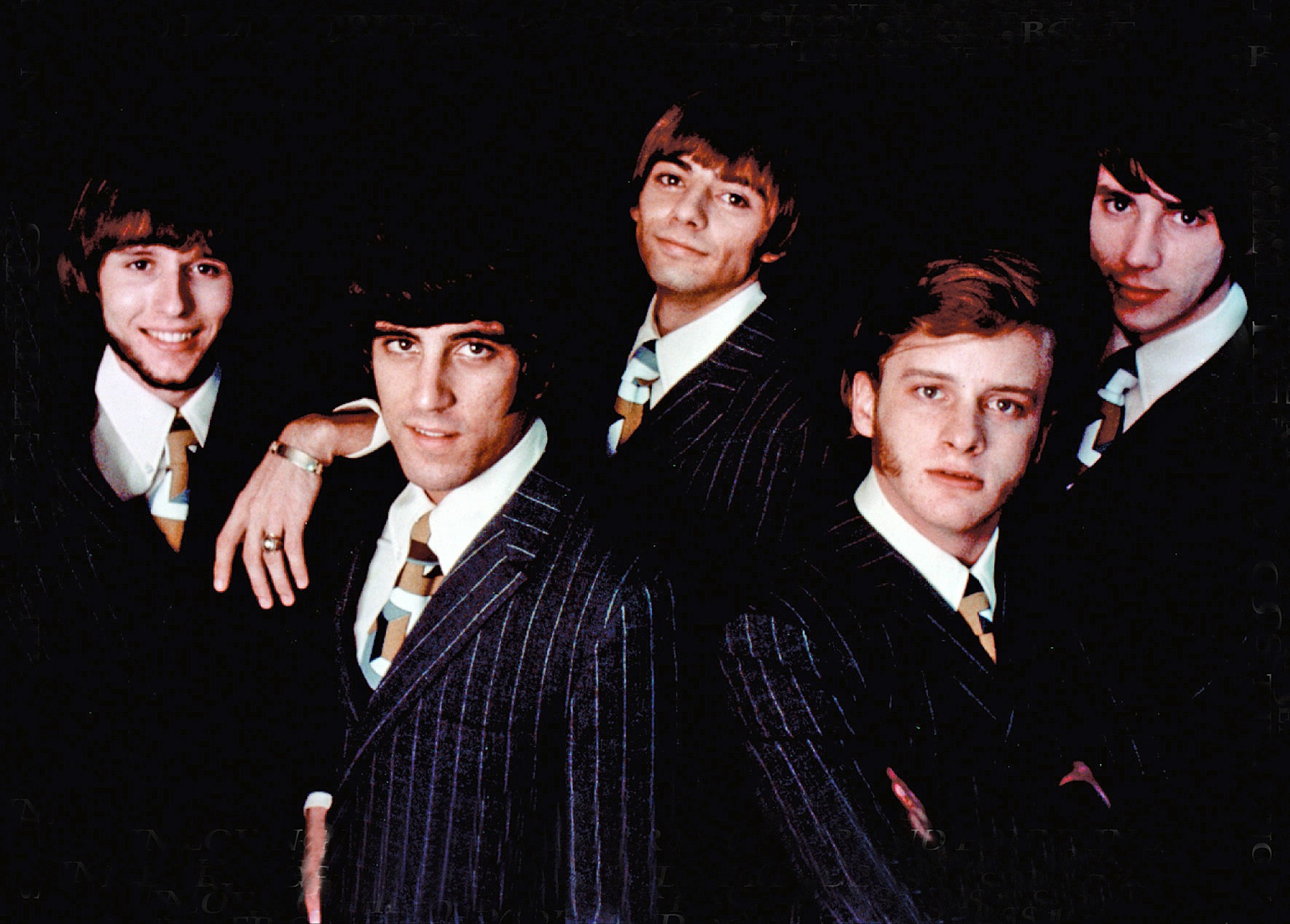
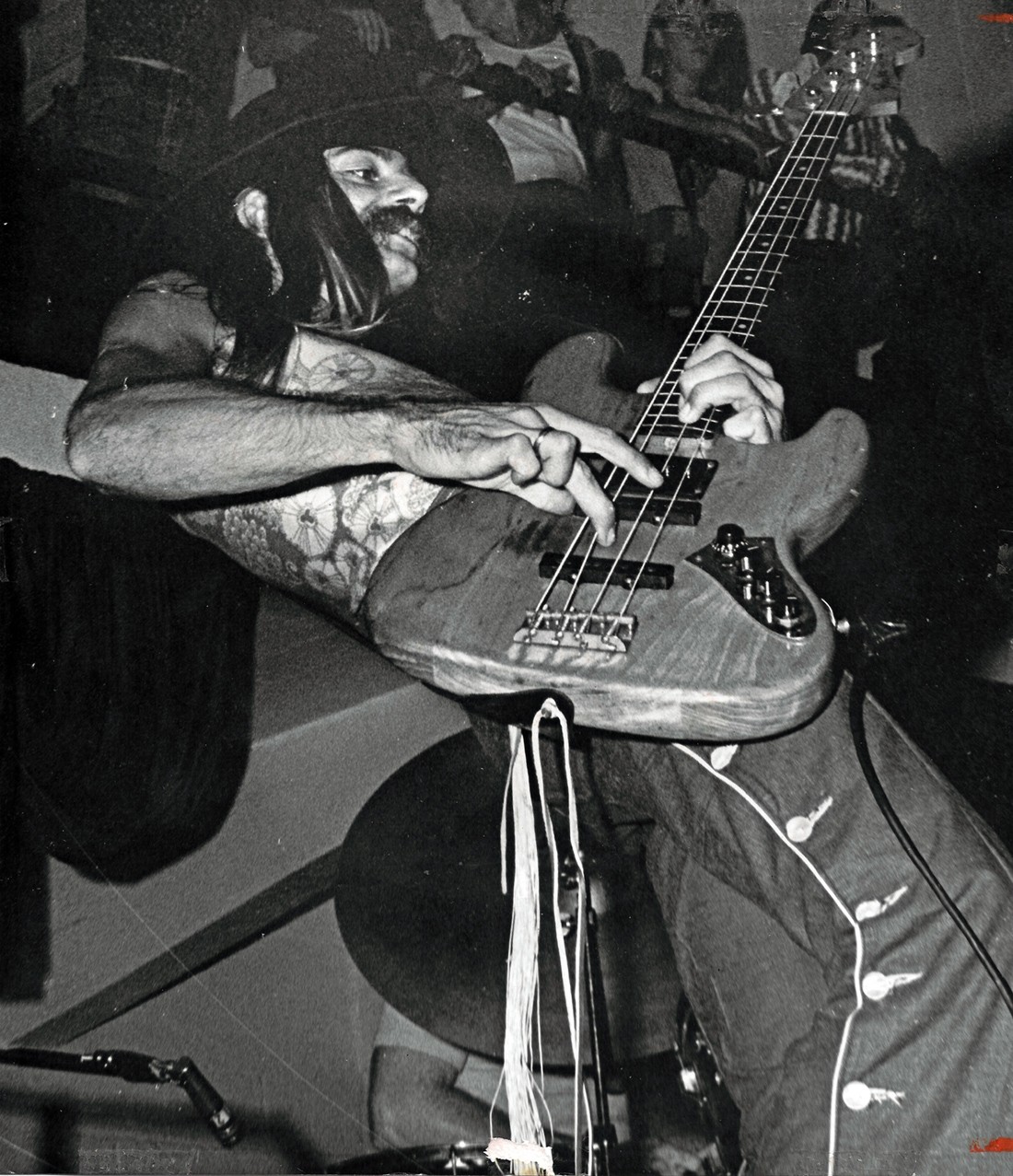

Have you ever had to pivot?
Releasing a string of successful singles, like It’s You I’ll Miss, You Better Move, For a Long Time and Black Jacket Woman, the years of 1965 and 1966 were the beginning of our growing success. Hearing those songs on the radio meant we had finally made it big! On July 30, 1966, in Chicago, Illinois, we stepped onto the McCormick Place stage to accept the trophy as the winner of the International Battle of the Bands, which included over 500 bands vying for fame and a contract with a major record label. Bands like Chicago and Tommy James & The Shondells played hard, but The Tropics won the honors, which included being interviewed on WLS in Chicago—and a contract with Columbia Records.
We became a road-worthy band and toured heavily around the country, appearing with acts like The Who, The Young Rascals, The Yardbirds, The Hollies, Dave Clark Five and Grand Funk Railroad.
In 1968, two years after winning the International Battle of the Bands in Chicago, we finally got to take advantage of our Columbia Records contract and recorded the song Time at their studio in New York City with producer Teo Macero. Aretha Franklin was in the next room recording some of her stuff. We met her in the hallway and she listened to our session. Her hit, Respect, was a song I sang in falsetto at some of our Tropics’ gigs at the time.
While in New York, we played at a nightclub in the city called “Steve Paul’s Scene”. When we went to scope out the venue, we entered a room downstairs in a dingy basement setting and heard the sound of Hang on Sloopy blasting through the doors. It turned out to be The McCoys with Rick Derringer playing The Scene that night. Up above was a coffee shop called The Greasy Spoon and on the jukebox was the very first time that we heard Purple Haze by Jimi Hendrix. Compared to cover songs like Paul Revere and the Raiders’ Kicks, The Tropics were blown away and embarrassed at the same time. When it came time for us to perform, we were greeted by an opening act in the personage of the one and only, Tiny Tim. He sang the song Tiptoe Through The Tulips and we proceeded to play music which included steps and choreography. I was feeling a little out of place in that hip little New York nightclub full of hipsters, beatniks and way too-hip New Yorkers.
Towards the end of our week playing the Scene, we visited a few other venues and sat in the front row during a Frank Zappa and the Mothers’ show. On our last night performing, we were visited by The Doors with Jim Morrison, who were slated to play there the following week. I couldn’t wait to get back home so I could feel halfway hip again because I really felt out of place in New York as a Tropic.
After its release, Time drew attention nationally and made American Bandstand’s “Rate a Record.” Scoring 92 on Bandstand meant that the hip Zombies-like tune would get national airplay. This tune, along with I Want More, is probably best remembered by Tropics’ fans. When Dick Clark held the microphone to a teenager who screamed, “The song has a good beat and you can dance to it,” the band was at a fan’s house at Cocoa Beach. We were all sitting down for dinner when we heard the song on national television for the first time. Yeah, that was it! They usually rated two songs on that segment of Bandstand. The other song that was up for voting was the Oogum Boogum song and I think that song won the higher rating.
We left Columbia Records, and after that the band recorded several singles for the Malaco label in Jackson, Mississippi. I wrote a Christmas song called Groovy Christmas under the moniker of “Chipper” instead of The Tropics in honor of my son, Chip Souza, who was born on the day after Christmas. I recorded it with Eric radio-ready, maybe obscure, as the flip side of Toy Soldier. I worked with Paul Davis who sang harmony on it. He ended up having a couple of hits, like I Go Crazy. “When I Look in Your Eyes, I Go Crazy.”
When recording in Malaco Studios, I used to stand on top of my 18” bass speaker to feel the vibrations go through my feet and my bones. One time, when Dr. John (Right Place Wrong Time) walked into the studio, he looked at me like I was crazy and said, “Whatcha doin’ up there, boy?” “Well, I’ve got to feel it in my bones, Dr. John, and these headphones just don’t get it.”
With our new psychedelic band Bacchus, Eric and I, together with Bill Peterson, a funky local drummer, we were now a three-piece heavy metal blues band. We rehearsed day in and day out there at the Bacchus Farm. Eric and I would jam from 10:00 at night until 6:00 in the morning. Getting lost in the music was once again my escape from reality.
Margie Sexton continued booking both bands: The Tropics and Bacchus. Margie booked Bacchus at several concerts, including one where we opened for John McLaughlin and The Mahavishnu Orchestra. We also worked many fraternity parties in Gainesville, frequented Jacksonville (which is where we recorded some of our records like Carry My Load and Celebration), traveled to Puerto Rico on a U.S.O. tour and played on the free stage at the Atlanta Pop Festival.
So now that the band had started to pick up some work, thanks to Eric’s diligence and Margie throwing some great concerts and bookings our way . One night in 1973, we were playing a gig in St. Pete when Gregg Allman came in to hear us. In 1971 his brother, Duane, died in a motorcycle crash and a year later another band member, bassist Berry Oakley, also died in a motorcycle crash.
After our gig, Gregg came back to my place. Eric and Bill also came over. I rode with Gregg in his limo, and as we were riding across Gandy Bridge to Tampa, he handed this gold-plated Allman Brothers mushroom pendant to me and asked if I’d join his band. While his driver waited outside with his big limousine parked in my driveway, Gregg came in for a while and we all sat around and talked. It was a memorable night!
I ended up hopping a plane with the ticket Gregg sent me and spending some time with him in Macon, writing songs on a small tape recorder in his living room. Then I attended his wedding to Jan Blair, sister of Ron Blair, future bassist for Tom Petty and the Heartbreakers. I was actually awe-inspired by the wedding. Love is a beautiful thing!—the kind of thing I had won and lost in earlier years.
He asked me to come to New York City to play on his debut solo album Laid Back. The engineer was doing overdubs with the horn section, taking me to a place I’d never been before. It was amazing! During that time, Gregg would carry his dead brother’s guitar around. From time to time he’d open the case to show me the guitar. He was deeply affected by Duane’s death. Being the naive person that I was (and still may be) I was thrown and deeply hurt by Gregg’s consumption of heavy drugs and the fact that he would invite women into the hotel room with us just one week after his marriage. Disillusioned, desperate and alone in New York City, I called my friend Bobby Caldwell, who was not far away in Long Island at the time, jumped in a cab and never said goodbye to Gregg. I eventually opted to tour with the New Cactus
Band. The Allman Brothers Band added bassist Lamar Williams.
One of those trips included a ride on a small plane with Todd Rundgren who sat in the front with his whiskey bottle clutched closely to his chest. He didn’t say much except for, “Ya’ll are a good band!” On most of the trips while we were touring, I boarded with my headphones blaring Pink Floyd’s Dark Side of the Moon from takeoff to landing
Sometimes our tour package included a group from Texas called Bloodrock and featured the Bob Seger Band. We played many shows together, including one in Bob’s home town of Detroit. It was there that I became friends with the Bob Seger band members. One in particular was a back-up singer named Stoney. She had recorded an album with another Detroit artist by the name of Meatloaf entitled appropriately Stoney and Meatloaf. She and I became an item and were closer than just friends. The tour went on, the package of the three bands separated, doing different concerts in different cities—and I lost track of Stoney along the way. Rock ‘n’ roll life is not often kind when it comes to the heart and romance. But while that three-band package tour lasted, the sax player in the Bob Seger band suggested to Bob that he hire me as the bass player. I was making $50 more a week with New Cactus so I declined the offer, which in later years turned out to be another choice in my rock career that I ended up regretting. There were many turning points and choices to be made during the ‘70s for me as I decided which way to go and when to “turn the page”. Once again, I had left my crystal ball at home in the closet!
It always seemed like there was a Higher Power in my life working, moving me from one band to the next, not really knowing how I got there. It must have been some sort of spiritual intervention when I hooked up again with my old friend, Buddy Pendergrass.
Buddy called the house one day while my wife Rachel and I were sitting
around watching TV and smoking cigarettes. He asked me to come over to the White Witch band house by MacDill at the MacDill Avenue gate and play some music. White Witch had been signed to Capricorn Records a year before and had released their first album in 1973 while I was clubbing it in Bacchus. Buddy had some new material and was set to record it in Miami in a few months’ time so we rehearsed for several weeks before we headed down to Criteria Studios. I had insisted to Buddy that we needed to have Bill Peterson track the drums with us to get a more solid recording, and it all worked out as Bobby Shea, the original drummer, opted to play percussion. The producers who worked with Eric Clapton on the album Layla, Ron and Howie Albert, were set to record the new White Witch album, A Spiritual Greeting.
In January of 1975 I received a call out of the blue from a kid who used to come to watch The Tropics play up in Gainesville in the ‘60s—Tom Petty. He had gotten my number from Margie Sexton and wanted to know if I’d be interested in playing bass with him in his band.
Shortly thereafter, someone I hadn’t seen since I was seven years old—my father—came to visit Rachael and me. While my dad was there, I received a 45 single from Shelter Records in California. It was a silly little song called Depot Street by Tom. I put the record on the player and turned it up real loud. That’s when my father came over to me and shouted, “Son, turn that music down!” He couldn’t get much rest at my house so he left the next morning and I never saw him again. Some years later I heard he had passed away.
At age 27 I had not developed my communication skills to a point where I could make myself clear about my own feelings and expectations. Most of my musician friends and acquaintances were in the same boat. My new friend, Tom Petty, had the same problem. When he picked up me and my bass guitar at the L.A. Airport with his two-seater Opel sports car, I knew then we were both Runnin’ Down A Dream. “T.P.” (his nickname at Shelter Records) obviously had great skills communicating in music with his songs as we all found out in the years to come, but while narrating our ride up the 405 and over the “big hill” as Tom described it and then into the San Fernando Valley, he had a hard time conveying to me what his plans were for our future together. Only recently, in reading some of the online tabloid articles and after receiving his endorsement of my book “Live Your Dream” , did I realize what he thought about me and my music. (Tom Petty wrote an endorsement of the book along with Rascals drummer, Dino Danelli) LiveYourDreamBook.com
There were many stories and transitions to come and quite a few more rock luminaries I was lucky enough to work with, but I am skipping a lot of them to moving forward to 2008 when I got to play in the same band with the best rock & soul drummer in the business, Dino Danelli in The New Rascals
About a month after the Wayne Youngblood benefit concert at The Villages in Lady Lake, I got a call from Gene Cornish asking me to play with the The New Rascals. My first gig with them would be in Medford, Oregon, December 30, 2006, and then the very next night I’d be playing with my band on New Year’s Eve in Tampa!
I became ecstatic and thought to myself, “Hey, this is a national act. I am going to be playing with two Rock and Roll Hall of Fame musicians.” What a great feeling! First, as an ex-Tom Petty bass player and a studio musician playing with assorted casual bands on the weekends and as a struggling artist in L.A., and now as a local musician in St. Petersburg, this seemed like it was another door opening and I was excited about it. I was yet to learn how things really play out in today’s world of touring.
Excited as I was to be playing with my ‘60s idol, drummer Dino Danelli, my first concert with the band involved a long trek across the country to Oregon. I had rehearsed with the CD that Bill had given me of the band playing live back in ‘04 before Bill was even in the band. Just like the original band with Felix Cavaliere on Hammond organ playing some bass notes, they still had no bass player even now, until me of course! So, on the rehearsal CD I had, I was hearing two other guys that weren’t even with the band anymore with no bass guitar so that I could learn my part in order to be able to play with the two Hall of Famers and Bill singing lead and doing the keyboard work. Of course, I had played most of this music in my days with The Tropics and through the years with other cover bands, plus I was also listening to the original recordings with Felix playing on them to help guide me to where the pocket should be with the bass in my headphones on the flight. My friend Bill told me that he was happy that he finally got a traveling buddy as he and I would do all the airport routines together now.
By the time I got to my first New Rascals gig after changing planes mid route, I was extremely tired but still got up to do the sound check and strike a note with the drummer who, in my book, was the top drummer in rock music back in the day. Dino was a reserved and eccentric individual who hardly spoke a word. But when he did, I listened!
The concert venue was catered with an over-abundance of meats and cheeses and the assorted fruit plate which Gene proceeded to sit beside, playing with the strawberries as if to say, “Is this all there is?” What a rock star this guy is, I thought. He’s used to being treated like a Rock God ever since the good old days of the ‘60s when the Rascals were Rock Gods, and through the years he hasn’t changed a bit!
Then, Dino walks into the food room with his two large drum sticks, saying hardly anything except, “Hey how ya doin’, Charlie?—lookin’ forward to it!”—and proceeds to tap out rhythms with his sticks on the furniture, playing the standard paradiddles and triplets. I asked Dino, “What ya doin, man?” He said, “Practicing.” I said, “Well, you’re one of the greatest drummers in the world. You don’t need to practice, do you?” Dino said, “Just keeping my chops up.” Humbled, I relented and we prepared to do what was for me the first Rascals’ music live set with two of the original members as I watched Dino scribble the list of songs we were about to play on a loose sheet of paper!
Contact Info:
- Website: http://charliesouza.com
- Instagram: https://linktr.ee/charliesouza
- Facebook: https://www.facebook.com/CharlieJSouza
- Linkedin: https://www.linkedin.com/in/charlesjsouza/
- Twitter: https://x.com/charliesouza
- Youtube: https://www.youtube.com/charliesouza/videos
- Other: https://linktr.ee/charliesouza
Image Credits
Public Domain


